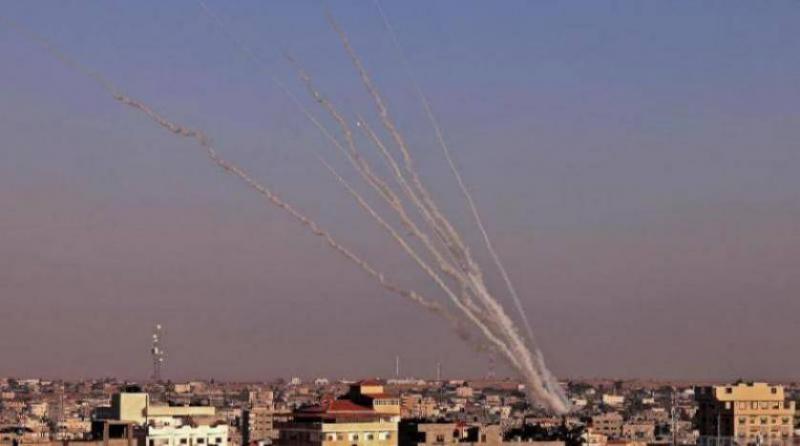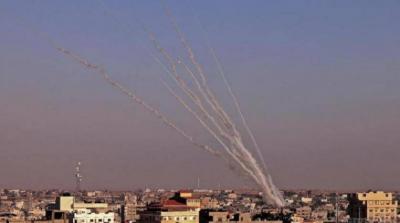Rockets from Hamas and Islamic Jihad have consistently confounded the technologically superior Israeli army. These rockets, named after deceased Islamic leaders, are mostly manufactured from primitive materials in clandestine workshops in Gaza. The current fighting across the border highlights a new strategy from armed Palestinian factions in Gaza: launching large numbers of rockets to exploit statistical failure rates in Israeli air defenses, thereby increasing the chances of casualties in Israeli cities.
The rocket launches have resulted in a near-constant wailing of sirens in Israeli communities near the Gaza border, prompting tens of thousands of residents to seek shelter and refuge. Since the fighting erupted on May 10, 12 people have been killed in Israel. Israel has heavily bombed Gaza, a densely populated area, where officials report that 219 Palestinians have died, many of whom are civilians. Israel claims that at least 160 militants have been killed, including rocket operators and manufacturers.
Israeli officials state that Gaza's arsenal of approximately 29,000 rockets or mortar shells has been reduced by half since the start of the conflict. Hamas and Islamic Jihad have not confirmed this information. Propaganda footage from the Palestinian factions shows rockets preloaded in small silos for remote launch, a method to protect operatives from Israeli counterstrikes. Israel claims that counterstrikes may be delayed or canceled against rocket launch crews in residential areas.
Ofer Akunis, an Israeli minister and former spokesman for Prime Minister Benjamin Netanyahu, told Israel Army Radio on Wednesday that firing up to 140 rockets within minutes at Tel Aviv and other locations "posed a challenge to our exceptional systems." He was referring to the Iron Dome, a missile interception system that Israeli statistics, confirmed by American military observers, indicate has a 90 percent chance of intercepting rockets identified by radar as threatening populated areas.
During calmer times, the Iron Dome is programmed to launch two Tamir missiles at an incoming rocket, increasing the interception probability to around 99 percent. However, an Israeli Air Force general stated that the Iron Dome is now limited, mostly to firing only one Tamir interceptor missile, meaning 10 percent of incoming rockets may get through.
High-Quality Rockets
The general told reporters at the Air Force headquarters in Tel Aviv on Saturday, "You cannot intercept 140 rockets with 280 Tamir missiles. The number is simply too large." He added that Israel has been supplying these missiles, each valued at $50,000, and sees no issues with supply.
It has been 20 years since Gaza militants first fired rockets into Israel. These rockets, named after Syrian preacher Izz ad-Din al-Qassam who fought the British in Palestine in the 1930s, were short-range with warheads weighing a few kilograms. Hamas and Islamic Jihad have sought to bolster their arsenals with high-quality rockets smuggled through Sinai, though campaigns from Cairo have significantly tightened this smuggling route.
Israeli and Palestinian sources now assert that militants are using funding and guidance from Iran to produce rockets within Gaza that can reach distances of 200 kilometers or more, some equipped with warheads carrying hundreds of kilograms of highly explosive TNT and shrapnel.
Iran does not publicly disclose specifics of its support for Palestinian and Lebanese armed groups opposing Israel. However, Iranian Revolutionary Guard Corps Commander Major General Hossein Salami stated in a televised speech on Wednesday that Iran supports the Palestinians' fight against Israel. Salami remarked, "The Palestinians have emerged as a nation equipped with missiles."
Iran's Supreme Leader Ayatollah Ali Khamenei stated in 2020 that the balance of power in the Israeli-Palestinian conflict is shifting due to Iranian planning and "with God's guidance," having noted that "the Palestinian fighter possesses religion, dignity, and courage, and their only problem is the lack of weapons."
The arsenal often appears primitive. A video from Hamas shows rockets made from discarded water pipes. Surveillance footage showed that a rocket that struck Be'er Sheva, located 50 kilometers from Gaza, landed on a road without detonating. The Israeli military, citing the same tracking data used in Iron Dome interceptions, reports that between 20 percent and a third of Palestinian rockets in the latest conflict fell inside Gaza, resulting in at least 17 civilian deaths.




